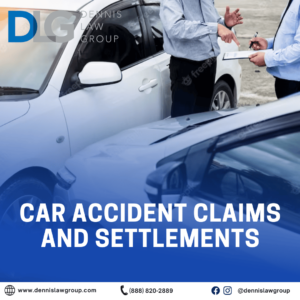Car accidents can be disruptive and life-altering events, often leading to physical injuries, property damage, and emotional distress. Understanding the intricacies of car accident claims and settlements is essential for ensuring you receive fair compensation and successfully navigate this challenging process. In this guide, we’ll explore the key steps, strategies, and considerations involved in the realm of car accident claims and settlements.
 I. Immediate Actions After a Car Accident
I. Immediate Actions After a Car Accident
The moments following a car accident are crucial. Prioritize the safety of all parties involved and seek medical attention for injuries. Exchange contact and insurance information with other drivers and document the accident scene through photos and witness statements. Reporting the accident to your insurance company promptly is vital for initiating the claims process.
II. Filing an Insurance Claim
Initiating an insurance claim is a pivotal step. Contact your insurance company and provide them with accurate details of the accident. Insurance adjusters will assess damages and determine liability. If another driver is at fault, filing a claim with their insurance company may be necessary. These initial steps set the foundation for the subsequent settlement process.
III. Evaluating Damages and Injuries
Accurate assessment of damages and injuries is essential for fair compensation. Document vehicle damage and property loss meticulously, capturing the extent of the impact. Compile medical records, bills, and expenses related to injuries. Understand that the severity of injuries directly influences the compensation you may receive.
IV. Strategic Settlement Negotiations
Negotiating a settlement requires strategy. Carefully review the initial settlement offer from the insurance company, keeping in mind that they may offer less than you deserve. Effective negotiation involves presenting strong evidence, such as medical records and repair estimates. Seeking legal advice, especially if negotiations become complex, can prove invaluable.
V. The Comparative Fault Factor
California follows a comparative fault rule, which means compensation is adjusted based on the degree of fault. If you share some responsibility for the accident, your compensation might be reduced. Demonstrating a clear understanding of liability and minimizing your own percentage of fault is critical to optimizing your settlement.
VI. Legal Recourse: Filing a Lawsuit
When negotiations fail, filing a personal injury lawsuit becomes an option. Ensure you’re aware of California’s statute of limitations for filing such lawsuits. Engaging an experienced attorney is advisable, as they can guide you through the litigation process, prepare your case, and represent your best interests in court.
VII. Mediation vs. Litigation: Exploring Options
Mediation and litigation are avenues for resolving disputes. Mediation offers an alternative to courtroom proceedings, allowing both parties to reach an agreement with the help of a neutral mediator. Litigation involves formal legal action and a trial. Consider the advantages of mediation, such as speed and reduced costs, before proceeding to litigation.
VIII. Effective Evidence Documentation
Compiling strong evidence can significantly impact your claim’s success. Preserve photographs, witness statements, and police reports from the accident scene. Maintained records of medical treatment, expenses, and correspondence with insurance companies. Well-documented evidence strengthens your position during negotiations or litigation.
IX. Dealing with Uninsured Drivers
Encountering uninsured drivers presents unique challenges. While your own insurance policy might cover such instances, legal assistance may be necessary to ensure you receive proper compensation. Understanding your policy’s provisions and seeking professional advice can help you navigate this scenario.
X. Protecting Your Legal Rights
Understanding your rights is paramount. Insurance companies have an obligation to act in good faith when handling claims. Being informed about your rights and responsibilities during the claims and settlement process is essential. Consulting legal experts ensures you’re not taken advantage of.
Conclusion
Car accident claims, and settlements demand attention to detail, legal acumen, and negotiation skills. By following the steps outlined in this guide, you’ll be better equipped to handle the aftermath of a car accident. Remember to prioritize safety, gather evidence, engage in strategic negotiations, and consider seeking legal assistance when necessary. By navigating this process with knowledge and vigilance, you can work towards obtaining the compensation you rightfully deserve.
Free consultations are available with Our Car Accident Lawyer in California
At Dennis Law Group, we know that finding the right car accident lawyer for your accident claim is important to your success.
You can find out whether you have a valid case at no cost to you. That’s because we offer free consultations. To request a free consultation with our team, call (888) 820-2889.
